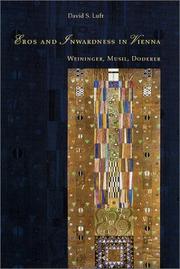| Listing 1 - 6 of 6 |
Sort by
|

ISBN: 0226496473 Year: 2003 Publisher: Chicago London The University of Chicago Press
Abstract | Keywords | Export | Availability | Bookmark
 Loading...
Loading...Choose an application
- Reference Manager
- EndNote
- RefWorks (Direct export to RefWorks)
Although we usually think of the intellectual legacy of twentieth-century Vienna as synonymous with Sigmund Freud and his psychoanalytic theories, other prominent writers from Vienna were also radically reconceiving sexuality and gender. In this probing new study, David Luft recovers the work of three such writers: Otto Weininger, Robert Musil, and Heimito von Doderer. His account emphasizes the distinctive intellectual world of liberal Vienna, especially the impact of Schopenhauer and Nietzsche in this highly scientific intellectual world. According to Luft, Otto Weininger viewe
Austrian literature --- National socialism --- Politics and literature --- History and criticism. --- Austria. --- Austrian literature. --- Austrian literature -- Austria -- Vienna -- History and criticism. --- Freud, Sigmund. --- Freud, Sigmund, 1856-1939 -- Influence. --- Intellectual life. --- National socialism. --- National socialism -- Austria -- Vienna. --- Politics and literature. --- Politics and literature -- Austria -- Vienna. --- Social life and customs. --- Vienna. --- Vienna (Austria). --- Vienna (Austria) -- Intellectual life. --- Vienna (Austria) -- Social life and customs. --- Freud, Sigmund, --- Influence. --- Vienna (Austria) --- Intellectual life --- Social life and customs --- Austria --- History and criticism --- Freud, Sigmund --- Influence
Book
ISBN: 0520053281 0520038525 Year: 1980 Publisher: London University of California Press
Abstract | Keywords | Export | Availability | Bookmark
 Loading...
Loading...Choose an application
- Reference Manager
- EndNote
- RefWorks (Direct export to RefWorks)
930.85 --- 930.85 Cultuurgeschiedenis. Kultuurgeschiedenis --- Cultuurgeschiedenis. Kultuurgeschiedenis --- -Musil, Robert --- Musil, Robert --- Criticism and interpretation --- Europe --- Intellectual life. --- Musil, Robert, --- Criticism and interpretation. --- Musel, Robert, --- Muzilʹ, Robert, --- Музиль, Роберт,

ISBN: 1283150794 9786613150790 0226496481 9780226496481 0226496473 9780226496474 0226496473 9780226496474 9781283150798 6613150797 Year: 2003 Publisher: Chicago University of Chicago Press
Abstract | Keywords | Export | Availability | Bookmark
 Loading...
Loading...Choose an application
- Reference Manager
- EndNote
- RefWorks (Direct export to RefWorks)
Although we usually think of the intellectual legacy of twentieth-century Vienna as synonymous with Sigmund Freud and his psychoanalytic theories, other prominent writers from Vienna were also radically reconceiving sexuality and gender. In this probing new study, David Luft recovers the work of three such writers: Otto Weininger, Robert Musil, and Heimito von Doderer. His account emphasizes the distinctive intellectual world of liberal Vienna, especially the impact of Schopenhauer and Nietzsche in this highly scientific intellectual world. According to Luft, Otto Weininger viewed human beings as bisexual and applied this theme to issues of creativity and morality. Robert Musil developed a creative ethics that was closely related to his open, flexible view of sexuality and gender. And Heimito von Doderer portrayed his own sexual obsessions as a way of understanding the power of total ideologies, including his own attraction to National Socialism. For Luft, the significance of these three writers lies in their understandings of eros and inwardness and in the roles that both play in ethical experience and the formation of meaningful relations to the world-a process that continues to engage artists, writers, and thinkers today. Eros and Inwardness in Vienna will profoundly reshape our understanding of Vienna's intellectual history. It will be important for anyone interested in Austrian or German history, literature, or philosophy.
Austrian literature --- Politics and literature --- National socialism --- History and criticism. --- Freud, Sigmund, --- Influence. --- Vienna (Austria) --- Intellectual life. --- Social life and customs. --- vienna, sexuality, gender, 20th century, freud, heimito von doderer, robert musil, otto weininger, nietzsche, schopenhauer, bisexuality, creativity, morality, ethics, flexibility, obsession, kink, desire, passion, control, self-control, ideology, nazi, fascism, submission, totalitarianism, eros, individual, agency, isolation, history, literature, philosophy, irrationalism, scientific materialism, character, national socialism, novel, nonfiction, apperception, soul, modernity, liberalism.
Book
Year: 1980 Publisher: Berkeley - Los Angeles - London University of California Press
Abstract | Keywords | Export | Availability | Bookmark
 Loading...
Loading...Choose an application
- Reference Manager
- EndNote
- RefWorks (Direct export to RefWorks)

ISBN: 0226554082 9780226554082 0226554090 9780226554099 Year: 1994 Publisher: Chicago : University of Chicago Press,
Abstract | Keywords | Export | Availability | Bookmark
 Loading...
Loading...Choose an application
- Reference Manager
- EndNote
- RefWorks (Direct export to RefWorks)
Book
ISBN: 1283114658 9786613114655 1612491782 9781612491783 9781612491943 1612491944 9781283114653 9781557535900 1557535906 Year: 2011 Publisher: West Lafayette, Ind. Purdue University Press
Abstract | Keywords | Export | Availability | Bookmark
 Loading...
Loading...Choose an application
- Reference Manager
- EndNote
- RefWorks (Direct export to RefWorks)
| Listing 1 - 6 of 6 |
Sort by
|

 Search
Search Feedback
Feedback About UniCat
About UniCat  Help
Help News
News